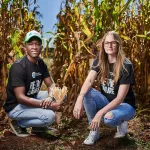WORLD HUNGER DAY Op-Ed
Our constitutional right to sufficient food and water: ‘Hunger is not an issue of charity, but one of justice’

More than two decades after the dawn of constitutional democracy in South Africa, hunger is still prevalent. While many of the inequalities and inequities South Africans face are a legacy of apartheid, the democratic dispensation has not lived up to expectations. The persistence of hunger is a case in point.
Oluwafunmilola Adeniyi is a post-doctoral fellow with the Socio-Economic Rights Project at the Dullah Omar Institute, University of the Western Cape.
Ebenezer Durojaye is the Head of the Socio-Economic Rights Project at the Dullah Omar Institute, University of the Western Cape.
The devastating effects of the Covid-19 pandemic, saw food insecurity rates rise, with more than 40% of the population in April 2020 classified as food insecure.
As the nation makes a gradual recovery to what is to become the “new normal”, inflation and the attendant rising costs of purchasing food still make regular food access for many unattainable. In its April 2021 Consumer Price Index (CPI) report, Statistics South Africa (Stats SA), reports a 14-month high in price inflation, cutting across many sectors and driving up food costs.
The question remains whether the government carries the responsibility for guaranteeing people’s access to food in South Africa.
The Constitution explicitly provides clarity on this. Specifically, section 27 (1) (b) of the Constitution notes that “Everyone has the right to have access to sufficient food and water…” and Section 28 (1) (c) gives an unqualified right to food for children when it notes “Every child has the right to basic nutrition…”

Children receive biscuits from the Groundbreakers community feeding programme in Ocean View, Cape Town. (Photo: EPA-EFE / Nic Bothma)
Although these constitutional provisions are yet to be fleshed out in other domestic laws, they provide a starting point for the state’s accountability to its people in ensuring their right to food. These constitutional provisions create a human rights-based approach towards ensuring that no one in South Africa goes to sleep hungry. In addition, South Africa is obliged under international and regional human rights instruments to respect, protect and fulfil the right to food.
A human rights approach is essential if food security for all must be guaranteed, for a number of compelling reasons.
First, a rights-based approach is underpinned by the indivisibility of all human rights. The fundamental right to life is contingent upon the fulfilment of the right to food — for, without food, the possibility of existing is obliterated — and the right to health, as a healthy lifestyle becomes impossible without adequate nutrition. In this light, a United Nations Development Programme (UNDP) Report indicated that hunger and malnourishment, directly or indirectly, account for more than half of the childhood deaths worldwide.
Second, the right to food is also linked to other rights, including the right to information as a safeguard to guaranteeing the right to health and the right to dignity.
Third, the enjoyment of many other rights including the right to education and work is contingent upon the realisation of the right to food. Malnutrition is an impediment to successful learning as well as psychosocial development in school-aged children. This can be assumed to also hold true for students in tertiary institutions. There is an interlink between the minimum wage and people’s access to food, housing and healthcare.
In addition, a rights-based approach to food security is essential because it prioritises the needs of vulnerable groups in society, thereby requiring immediacy in the redress of any violations of the right. This is the case for millions of South Africans today. In this regard, a crisis response requiring direct and immediate interventions from the State comes of necessity rather than long-term responses.
The high court in 2020 pronounced on the protection of the right to food of a vulnerable group during extraordinary circumstances which the State might be confronted with, in the case of Equal Education & Another Vs Minister of Basic Education & Others. The claimants brought an order for an urgent declaratory injunction against the Minister of Basic Education and the MECs of Education of eight provinces, declaring a breach of the constitutional right to food of learners in the basic education system under the National School Nutrition Programme (NSNP). The NSNP, which provided at least one meal a day up to nine million identified vulnerable learners, was halted during the first six months of the lockdown.
In its judgment the court emphasised that the rights to basic nutrition and basic education of children are fundamental rights that demanded more than just a reasonable plan — these rights need a plan capable of making immediate implementation possible. This case is poignant in showcasing how the judiciary can enforce and entrench the fulfilment of the right to food — especially for vulnerable groups.
In this regard, the court ordered the national and provincial Departments of Basic Education (DBE) to roll out the NSNP to all eligible children without delay, regardless of whether they have returned to school or not. In affirmatively granting the injunctions, the court in its judgement consequentially iterated that “Hunger is not an issue of charity, but one of justice.”
Thus, a rights-based approach to food security has the potential to empower citizens to hold state governments accountable for fulfilling a minimum core in guaranteeing the right to food. It also encourages the participation of citizens and gives a platform for otherwise vulnerable and marginalised groups in society to legitimately seek solutions to their socioeconomic challenges.
In strengthening the call for a rights-based approach to food security in South Africa, attention must be paid to the government’s international and regional commitments on the right to food.
For instance, the United Nations Committee on Economic Social and Cultural Rights (CESCR) in its General Comment 12 (GC12), iterates that the freedom from hunger is immediately realisable:
“Every State is obliged to ensure for everyone under its jurisdiction access to the minimum essential food which is sufficient, nutritionally adequate and safe, to ensure their freedom from hunger.”
Recently, the CESCR made concrete recommendations to South Africa on measures which it must take to strengthen and fulfil the right to food for all in South Africa, including the need for a framework law for protecting the right to food.

Ederies Samodien (centre) hands apples to a child from the 7de Laan shack settlement as he assists the 9 Miles Project Covid-19 community support programme in Strandfontein, Cape Town (Photo: EPA-EFE / Nic Bothma)
It is imperative to note that the African Commission implied the provision of the right to food in the African Charter on Human and Peoples’ Rights through its jurisprudence and that South Africa has ratified the African Charter. At the core of these instruments — whether constitutionally or by regional and international instruments — is the recognition that hunger anywhere in the world is a justice issue, and should elicit a corresponding response.
The call to end hunger in South Africa cannot be realised outside the framework of justice and human rights. Fronting a rights-based approach to ending hunger is the first step to guaranteeing everyone’s right to food.
From the constitutional to other international and regional instruments, the state is empowered to explore legislative and other substantive measures to end hunger. A wide range of measures have been and continue to be suggested by core stakeholders, including:
- Lowering barriers to agricultural entry and eliminating market access for small-scale farmers;
- The introduction of a basic income grant which adequately responds to realities of macroeconomics and inflation in South Africa; and
- The move from a heavily corporatised food system to a diversified and inclusive system.
These measures are even more imperative, given the impact of Covid-19 on the lived realities and socio-economic wellbeing of the people of South Africa. These measures are implementable across the value chain of food production from farm gate to plate. The state must explore, in conjunction with its stakeholders, measures to eliminate barriers — especially economically — to accessing food. Eliminating these barriers is key for ensuring a just and rights-based food system in South Africa. DM/MC

















 Become an Insider
Become an Insider
Comments - Please login in order to comment.